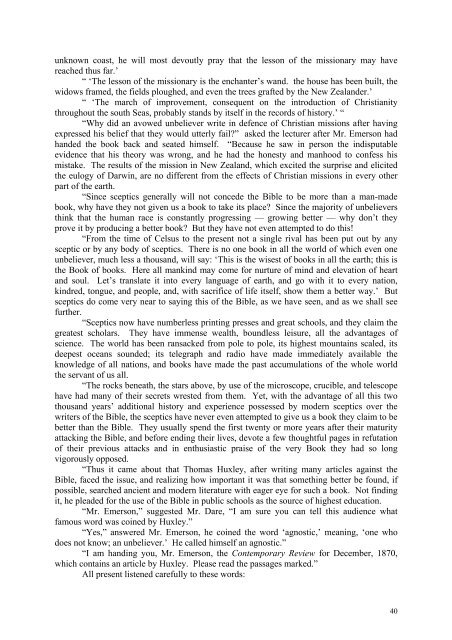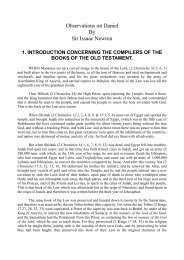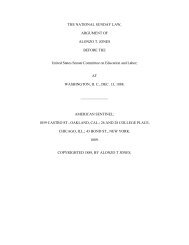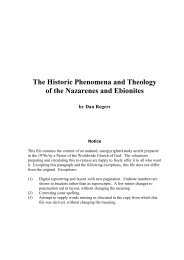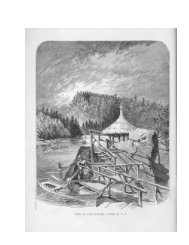Prophecy Speaks (E.A.Rowell).pdf
Prophecy Speaks (E.A.Rowell).pdf
Prophecy Speaks (E.A.Rowell).pdf
You also want an ePaper? Increase the reach of your titles
YUMPU automatically turns print PDFs into web optimized ePapers that Google loves.
unknown coast, he will most devoutly pray that the lesson of the missionary may have<br />
reached thus far.’<br />
“ ‘The lesson of the missionary is the enchanter’s wand. the house has been built, the<br />
widows framed, the fields ploughed, and even the trees grafted by the New Zealander.’<br />
“ ‘The march of improvement, consequent on the introduction of Christianity<br />
throughout the south Seas, probably stands by itself in the records of history.’ “<br />
“Why did an avowed unbeliever write in defence of Christian missions after having<br />
expressed his belief that they would utterly fail?” asked the lecturer after Mr. Emerson had<br />
handed the book back and seated himself. “Because he saw in person the indisputable<br />
evidence that his theory was wrong, and he had the honesty and manhood to confess his<br />
mistake. The results of the mission in New Zealand, which excited the surprise and elicited<br />
the eulogy of Darwin, are no different from the effects of Christian missions in every other<br />
part of the earth.<br />
“Since sceptics generally will not concede the Bible to be more than a man-made<br />
book, why have they not given us a book to take its place? Since the majority of unbelievers<br />
think that the human race is constantly progressing — growing better — why don’t they<br />
prove it by producing a better book? But they have not even attempted to do this!<br />
“From the time of Celsus to the present not a single rival has been put out by any<br />
sceptic or by any body of sceptics. There is no one book in all the world of which even one<br />
unbeliever, much less a thousand, will say: ‘This is the wisest of books in all the earth; this is<br />
the Book of books. Here all mankind may come for nurture of mind and elevation of heart<br />
and soul. Let’s translate it into every language of earth, and go with it to every nation,<br />
kindred, tongue, and people, and, with sacrifice of life itself, show them a better way.’ But<br />
sceptics do come very near to saying this of the Bible, as we have seen, and as we shall see<br />
further.<br />
“Sceptics now have numberless printing presses and great schools, and they claim the<br />
greatest scholars. They have immense wealth, boundless leisure, all the advantages of<br />
science. The world has been ransacked from pole to pole, its highest mountains scaled, its<br />
deepest oceans sounded; its telegraph and radio have made immediately available the<br />
knowledge of all nations, and books have made the past accumulations of the whole world<br />
the servant of us all.<br />
“The rocks beneath, the stars above, by use of the microscope, crucible, and telescope<br />
have had many of their secrets wrested from them. Yet, with the advantage of all this two<br />
thousand years’ additional history and experience possessed by modern sceptics over the<br />
writers of the Bible, the sceptics have never even attempted to give us a book they claim to be<br />
better than the Bible. They usually spend the first twenty or more years after their maturity<br />
attacking the Bible, and before ending their lives, devote a few thoughtful pages in refutation<br />
of their previous attacks and in enthusiastic praise of the very Book they had so long<br />
vigorously opposed.<br />
“Thus it came about that Thomas Huxley, after writing many articles against the<br />
Bible, faced the issue, and realizing how important it was that something better be found, if<br />
possible, searched ancient and modern literature with eager eye for such a book. Not finding<br />
it, he pleaded for the use of the Bible in public schools as the source of highest education.<br />
“Mr. Emerson,” suggested Mr. Dare, “I am sure you can tell this audience what<br />
famous word was coined by Huxley.”<br />
“Yes,” answered Mr. Emerson, he coined the word ‘agnostic,’ meaning, ‘one who<br />
does not know; an unbeliever.’ He called himself an agnostic.”<br />
“I am handing you, Mr. Emerson, the Contemporary Review for December, 1870,<br />
which contains an article by Huxley. Please read the passages marked.”<br />
All present listened carefully to these words:<br />
40


